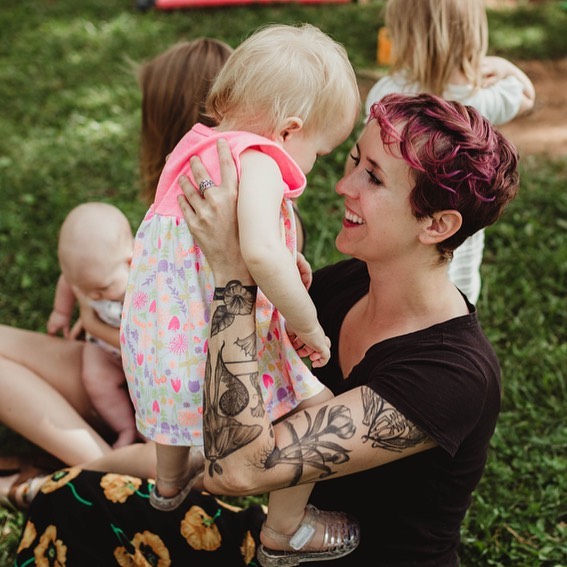When Haden Polseno-Hensley and his wife Rose McCutchan—co-owners of Red Rooster Coffee, a café and roasting company— were having their first child, they did what so many families do: they looked around for affordable, high-quality child care options. They weren’t the only ones searching for help; some of their employees were growing their families as well. But in Floyd, Virginia (population 450), a rural community in the beautiful Blue Ridge Mountains, it was a challenge to find an affordable, convenient child care center. So they decided to start their own.
Actually, it wasn’t quite that straightforward a process: At first, they simply rented a room and hired a babysitter for their child as well as their employees’ children. Soon, however, they had moved into a larger space; their business was growing, their staff was growing and the children were growing as well. “We needed to think about formalizing it and making it more than just babysitting, making it something that was productive for the child,” Polseno-Hensley says. “It was a decision born of necessity [and] a desire to do what we could—without really knowing what that meant or even really having the resources to do it.”

Options were limited. The local Montessori school had just closed, and one of their friends recommended that they reach out to Ella Zander, a teacher at that school. It was a crucial introduction, it turns out, as Zander joined as program director of their new child care center, which they named Yellow Hen. “She had our licensing done in a matter of months, about as fast as you can turn it around. And all of a sudden, we were operating a licensed child care operation where children up to age five had a period of time during the day where they’re more involved in a Montessori-style academic structure.”
Currently, Yellow Hen has enrolled 10 children, with a top capacity of 16. And for employees, Red Rooster covers 70% of the expense: workers pay $2 an hour. (Non-employees can also join, for an undisclosed weekly fee.) The financial burden, he says, is “huge,” but he considers it a need similar to health insurance, which Red Rooster also provides. “It’s part of a holistic benefits system that we’re trying to build, of covering health insurance premiums and offering retirement, and just trying to invest whatever we can in the people who work here.”
It’s not easy to find the right team members in such a small town, so when Polseno-Hensley finds talent, he wants to do what he can to retain them. “If you have somebody who’s really passionate about the product and the company and they want to continue working and have a child at the same time, you want to figure out a way to make that happen. There’s not a huge pool of people to bring into work here. So, when we find people [who] are really talented or really dedicated, we want to do everything we can to keep them.”
Employer-run child care has become increasingly popular with larger companies, including Microsoft, General Mills and Johnson & Johnson as only a few examples. It’s one solution to an ever-expanding crisis: the U.S. Bureau of Labor Statistics reported that up to 100,000 Americans have had to stay home each month due to child care needs. These missing wages add up to $122 billion each year, according to this report by Council for a Strong America.
The child care gap is even wider in rural areas; Linda K. Smith, director of the Early Childhood Initiative at the Bipartisan Policy Center think tank, told Context that 35% of rural families have unmet child care needs, compared to 28% of families in urban areas.
But not everyone believes that employer-run programs are the path forward to solving the national child care crisis: As child and family policy expert and Early Learning Nation magazine contributor Elliot Haspel argues, “employer-sponsored benefits are fool’s gold — they don’t put more money in the system to address crippling workforce shortages. …On-site centers reach only the barest minority of employees. And losing your job shouldn’t mean your child losing their beloved caregiver.”
However, Haspel sees the Red Rooster’s program in a different light, telling me: “When you have semiconductor chip manufacturers or when you have Fortune 100 companies that really have a lot of political clout and a lot of employees, then it starts to look like, this is what we’re going to do: we’ll just make the employers deal with child care. But I don’t think politicians are looking at the Red Rooster and being like, let’s change our child care policy based on what they’re doing.”
That said, he wishes they were able to use their resources for other things that are going to help them run a vibrant and thriving sustainable business. “I appreciate and applaud the intention of the owners who decided to do this. But they shouldn’t have to.”
In Polseno-Hensley’s view, they’re doing what they can because they feel it’s important to the community. “We personally know a lot of parents who end up staying home for a number of years. If you’re lucky enough to have a partner who can support the family during that time, that’s great. But a lot of times, it puts people back a couple of years in their financial planning and in their careers. It would be great if those decisions could be made solely on the basis of whether or not the parent wanted to stay home with the kid rather than whether or not they could financially survive.”
For all the complications and expense, the benefits to Red Rooster’s owners and employees have been well worth it. “There are three kids that have been there for six years: my son, the managing partner’s daughter and another boy. And there’s just a level of comfort and comradery and a bond with them that frankly is something you wish for your child to be able to have.”
Alice Bradley is a Brooklyn-based writer and editor. She has written for numerous magazines and sites, including Salon, Health, Parents and Real Simple, and was a contributing editor to Creative Nonfiction. She co-wrote the humor book “Let’s Panic About Babies!”



